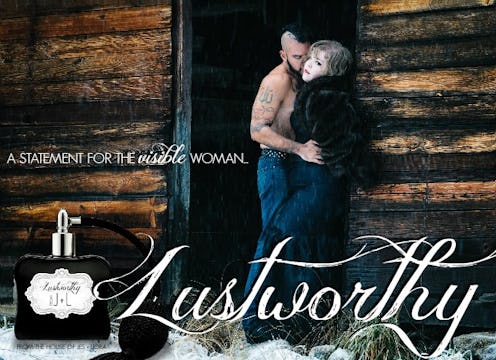Fashion
The One Problem With These Lustworthy Ads

The premise behind the "Lustworthy" project, a series of (fake) perfume advertisements, is striking: most "body-positive" movements focus on accepting larger bodies, but fail to actually deem large bodies worthy of sexual interest. The Lustworthy project not only places a plus-sized model directly into the role of the sexually desired, but it also breaks down ideas that like must be paired with like; in other words, a conventionally attractive man must be photographed with a conventionally attractive woman, and so on.
The project is the brainchild of Jes Baker, who models in the ads and writes over at The Militant Baker, and photographer Liora K. The photographs depict Baker, dressed in a sultry black corset and red lipstick, being breathlessly kissed, held, and generally adored by a really buff dude. The images are striking and thought-provoking. And here's the tagline:
Lustworthy: a statement for the visible woman.
Oh, great.
I see what Baker is trying to do here. In a society where the ideal beauty is tall and thin, the tall/thin women get societal approval, get the eye of the camera trained on them, get the rich/shallow businessmen buying them martinis, and all the other signifiers of visibility. Anyone who doesn't fit that conventional idea feels passed-over, invisible. And this ad is trying to change that.
But the word "visible" should not have been used here. Emphasizing that a larger woman is visible (bold and italics theirs, not mine), implies that anyone with a smaller figure is not visible. Is, in fact, invisible. And here we go again, pitting bodies against each other in ways that imply, intentionally or otherwise, that when one body wins, another has to lose.
The phrase "visible woman" reminds me of that awful aphorism, "Real women have curves." Despite the ridiculous syntax of the phrase — if real women have curves, and one does not have curves, one is not a real woman — you can still find it all over Pinterest and splashed onto cheap t-shirts.
Look at some of these charming memes that continue this idea of pitting thin against fat, determined that if one figure is desirable, the other cannot be:
- "Bones are for the dog. Meat is for the man." Translation: dating a skinny girl? You're not just immature, you're an animal.
- "Remember, any idiot can drive a straight line, but it takes an expert to handle curves." Translation: a skinny girl's sexuality is simple and idiot-proof.
- Victoria's Secret "Love Your Body" campaign. Translation: love your body… if it looks like ours.
- "Don't stop until you're proud" (workout meme featuring skinny girl). Translation: any body that doesn't look like this is something to be ashamed of.
In her defense, I don't for a minute believe that Baker intended to diminish or mock thin women with these ads. A quick glance at her blog reveals just how supportive she is of all body types (elsewhere, she writes that her Smash the Scale project is "for every skinny girl accused of anorexia and every fat girl that’s called lazy"). But words carry just as much weight as a photograph (says the writer).
Every adjective has not just its denotation, but its pervasive, ethereal connotation. That's why we have to be so careful.